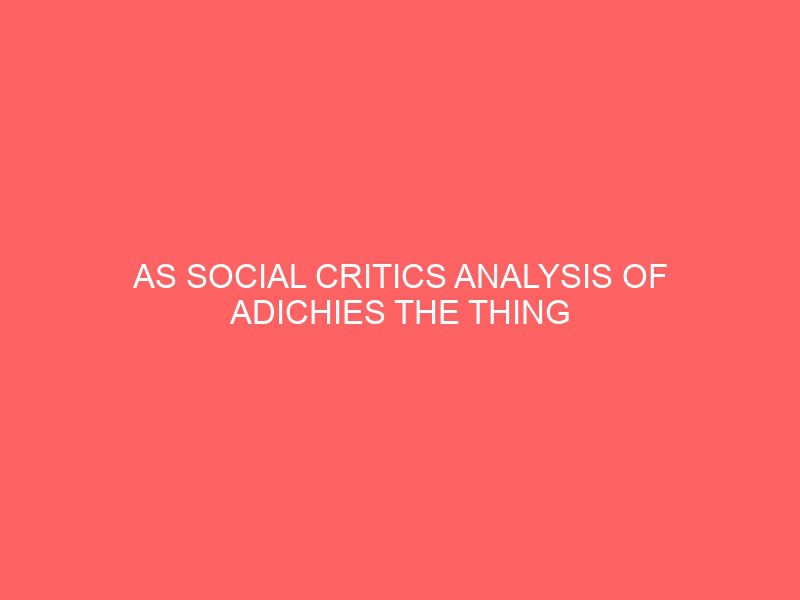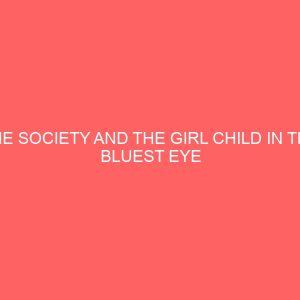Description
CHAPTER ONE
1.1 INTRODUCTION
Chinweizu and others, in their book Towards the Decolonization of African Literature said that:
The life of man being portrayed in any literary works of art, is perpetually setting goals for man to pursue. Society creates the material for art. For art, especially literature to be successful therefore, the artist has it a professional responsibility to make his work relevant to his society and its concern. The African writer is expected to perform certain functions and perhaps this accounts for the various roles which both critics and writers ascribe to him.225
Kole, Omotosho in his book, The Form of the African and the Writer in Modern Society. Writes that:
It is imperative that poverty, ignorance, disease. Are societal challenges to be confronted with the human and material resources of society, including the characteristics of the society.16
Since the emergence of the African novel, the Nigerian writers have pursued different themes which could be used to distinguish between those I call the younger writers and the older writers. An explanation of the writers that make up the younger group requires a brief reflection into the history of the Nigerian writers and what they have set out to achieve.
The older or pioneer writers are those whose works preceded the Nigerian civil war, and the common themes observed by them were cultural conflicts and the African past. Wole Soyinka at Upsala in 1968 distinguished this class of writers, when he said:
The background starts at the untold opposition by the colonized, to the external conflict. Victory of sorts came and the writer submitted his integrity to the monolithic stresses of time. For this, any manifesto seemed valid, anyism could be embraced with a clear conscience. With few exceptions the writer directed all his energy to enshrining and reaffirming his identification with the aspirations of nationalism and the stabilization of the society.
The early writings of Achebe, Soyinka, Amos Tutuola, Isidore Okphewho, Festus Iyayi, Buchi Emecheta, Osofisan, Sofola and John Munoye, belong to this phase of African Literature.
In other words, Achebe in his book: Morning Yet On Creation Day, writes that:
These writers were mostly concerned with helping the society regain belief in itself and put away the complexities of the years of denigration and selfabasement caused by the colonial masters, during the period of colonialism. 44
His Things Fall Apart, for instance is a reaction against the badly distorted image of Africa and her people portrayed by Joyce Carey, in his Novel Mr. Johnson.
The writings of some of the members, of this group went a step further by reflecting the events that took place in the African states especially after independence. The Interpreters by Wole Soyinka and Achebes A Man Of The People expose with ruthless irony and satire the moral and political corruption that permeates the postcolonial Era.
On the other hand, the younger writers adopted an alternate approach to the obsolescent, they Address the sociopolitical problems affecting Nigeria and offer alternatives for social change. These writers better called contemporary, became writers with a new vision to better the lot of the common man in an age that is growing fast in science, technology and politics. Some of the writers are: chimamanda Ngozi Adichie, Sefi Atta, Ukamaka Olisakwe, Richard Ali, Emmanuel Iduma, Sylva Nze Ifedigbo and others.
These postcivil war writings in Nigeria, witnessed shifting trends in themes. Justifying this, Osofisan, A middle Age Nigerian writer, clearly distinguish this group of writers from the previous ones in his book, Western Parasthetics and the Growth of Ekwensi Tradition Vol 1. He observed that:
The works of Soyinka, Achebe and Clark being products of transition, they look more to the past and to the unknown future. But the works of today have defined their province; they focus graphically on the present alone. The works of the earlier consciously crave for Luminous area of language and metaphor, they seek to distill banal experience into crystallized visions. 2
These younger writers refrained from the rehearsal of the old cultural conflict and treated it as outmoded. They believed that apart from the problems created by this cultural conflict, Nigerians still created problems for themselves, especially the small minority who professed to be the ideal of mans inhumanity to man but held the great majority in the grip of their political machines. This aroused a kind of awareness in the younger writers and that is why their focus is on the plight of the masses.
1.2 Background of the study
Social criticism can be said to perform some functions. According to online wikipedia,
social criticism analyses social structures which are seen as flawed and aims at practical solutions by specific measures, often consensual reform but sometimes also by powerful revolution.
hltp/en.wikipedia.org/wiki/social criticism.
The younger Nigerian writers tend to be dynamic rather than static. The new urban ethos is very much in their works, with its mixture of pidgin English and plain speech styles, its crime bent, convention breaking characteristic, traffic hold ups, its elite and slum developers, its rich and poor.
These younger literary writers treat literature as a product of social change. Social criticism has taken and is still taking, different forms in different African novels. But these criticisms have one thing in common: they all express disillusionment with the prevailing condition in the new African nations. These new Nigerian writers and critics, in their criticism used literature as a weapon in the struggle for justice. They, highlight in very bleak terms the weakness and calumny of the society with a view to restoring the permanent values of the society: Justice, freedom, and human dignity. These sociopolitical and economic problems which affect the growth of their society has made them aware of the necessity for a change in these areas.
Thus, these writers see the morality and realistically inspired individuals, as the agents of the reaction that would cleanse and purify the society.
1.3 PURPOSE OF THE STUDY
This project, attempts to see two members of this group of younger writers as social critics, their zeal and determination to foresee the desired change in their society for the better, through their realistically written short stories which do not leave any contemporary issue unaddressed.
This study seeks to show the problems affecting the growth of Nigeria, the relevance of the short story genre as opposed to the novel which had taken Conner stone in literature in the past years. It seeks to find out if the efforts of these younger writers in their use of the short story genre, are impressive enough as to encourage other upcoming writers and readers so that, attention can be drawn to this genre which had received little or no attention. These are the issues the writer wishes to discuss.
1.4 OBJECTIVE OF THE STUDY
The general objectives of this study can be broken down into the following specifics. It intends to help readers develop awareness of the social, political, economic, religious problems affecting the Nigerian society and hopefully trigger a more pragmatic response. Certainly it offers hope for the future. The two young writers and their short stories seek to understand the sensitivity of recent history on contemporary affair. Their characters are aware of, and receptive to, the ebb and flow of politics as it crosses into their lives, touching families, friends and themselves. Murder, hardship, assassinations, poverty, the crippling corruption of a nation strong enough to impose its will but not powerful enough to completely suppress dissent These are the topics of the two collection of short stories used in this work.
1.5 SIGNIFICANCE OF THE STUDY
This study is important because its result can go a long way in finding out the causes of some social problems the country is facing and the possible solutions.
This work will no doubt, contribute to ones knowledge of the younger Nigerian writers and their aims as social critics for the upcoming writers to learn. It will also be a guide for the federal government to refrain from its corrupt governance and be more alert because the masses are aware of its evil deeds.








Reviews
There are no reviews yet.